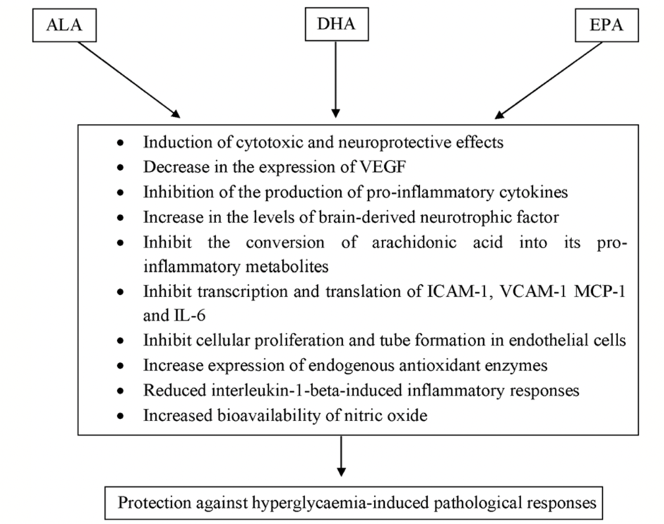Diabetic retinopathy, a neuro-microvascular complication associated with diabetes mellitus, is a sight-threatening condition in which the cumulative effect of a series of pathological events can eventually lead to retinal detachment and vision-loss. Because of the severity of its consequences, researchers have been very interested in discovering therapeutic and preventive agents to inhibit the progression of this complication.
Through an extensive literature review, researchers have found that omega-3 fatty acids have a wide range of protective properties, such as anti-inflammatory, anti-angiogenic and antioxidant (As shown below). They inhibit a wide range of inflammatory mediators involved in the pathophysiology of diabetic retinopathy, besides decreasing the formation of free radicals, and inducing the expressions of endogenous antioxidant enzymes. Also, they remarkably prevent the initiation of retinal angiogenesis by downregulating the expressions of various angiogenic agents such as VEGF, MMPs and COX-2. Owing to the mentioned pharmacological activity, omega-3 fatty acids greatly retard the advent of the characteristic pathological events characterizing diabetic retinopathy.
Therefore, omega-3 may prove to be clinically beneficial in preventing the progression of this diabetic complication, in addition to their use in the treatment of other cardiovascular diseases. Therefore, using the potential of omega-3 in preventing the progression of diabetic retinopathy, we can develop effective preventive drugs to protect diabetic patients from this vision-threatening complication.

Behl, T., & Kotwani, A. (2017). Omega-3 fatty acids in prevention of diabetic retinopathy. Journal of Pharmacy and Pharmacology, 69(8), 946-954. [Link]
